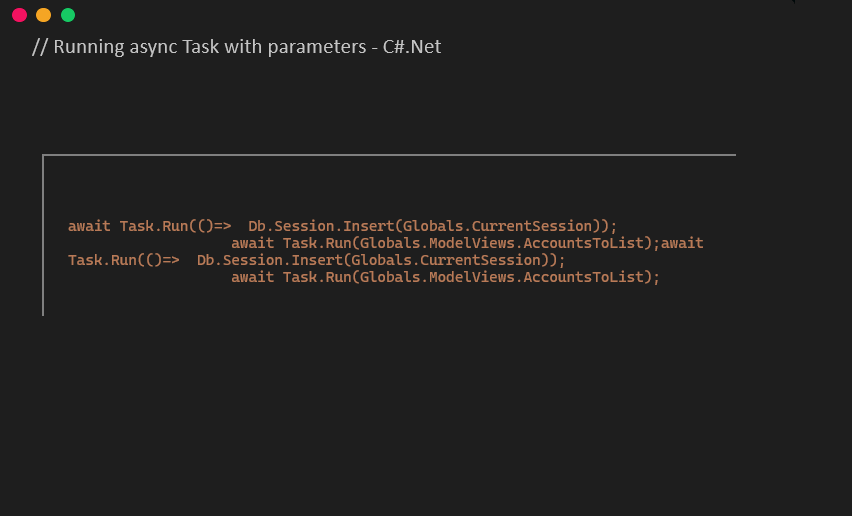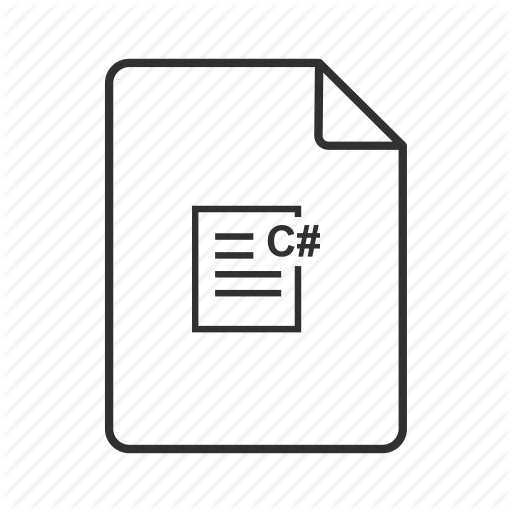|
// The orginal class was obtained from official site, then I made some desirable changes such as `UpdateOrAdd`, |
|
// which I think usefull for others |
|
// |
|
using System; |
|
using System.Collections; |
|
using System.Collections.Generic; |
|
using System.ComponentModel; |
|
|
|
namespace mynamespace |
|
{ |
|
|
|
class ObservableDictionary : IDictionary<string, string>, INotifyPropertyChanged |
|
{ |
|
//------------------------------------------------------ |
|
// |
|
// Constructors |
|
// |
|
//------------------------------------------------------ |
|
|
|
#region Constructors |
|
|
|
/// <summary> |
|
/// Creates a ContentLocatorPart with the specified type name and namespace. |
|
/// </summary> |
|
public ObservableDictionary() |
|
{ |
|
_nameValues = new Dictionary<string, string>(); |
|
} |
|
|
|
#endregion Constructors |
|
|
|
//------------------------------------------------------ |
|
// |
|
// Public Methods |
|
// |
|
//------------------------------------------------------ |
|
|
|
#region Public Methods |
|
|
|
/// <summary> |
|
/// Adds a key/value pair to the ContentLocatorPart. If a value for the key already |
|
/// exists, the old value is overwritten by the new value. |
|
/// </summary> |
|
/// <param name="key">key</param> |
|
/// <param name="val">value</param> |
|
/// <exception cref="ArgumentNullException">key or val is null</exception> |
|
/// <exception cref="ArgumentException">a value for key is already present in the locator part</exception> |
|
public void Add(string key, string val) |
|
{ |
|
if (key == null || val == null) |
|
{ |
|
throw new ArgumentNullException(key == null ? "key" : "val"); |
|
} |
|
_nameValues.Add(key, val); |
|
FireDictionaryChanged(); |
|
} |
|
|
|
/// <summary> |
|
/// Removes all name/value pairs from the ContentLocatorPart. |
|
/// </summary> |
|
public void Clear() |
|
{ |
|
int count = _nameValues.Count; |
|
|
|
if (count > 0) |
|
{ |
|
_nameValues.Clear(); |
|
|
|
// Only fire changed event if the dictionary actually changed |
|
FireDictionaryChanged(); |
|
} |
|
} |
|
|
|
public void UpdateOrAdd(string key,string value) |
|
{ |
|
if (ContainsKey(key) == false) |
|
{ |
|
Add(key, value); |
|
} |
|
else |
|
{ |
|
Remove(key); |
|
Add(key, value); |
|
} |
|
} |
|
|
|
/// <summary> |
|
/// Returns whether or not a value of the key exists in this ContentLocatorPart. |
|
/// </summary> |
|
/// <param name="key">the key to check for</param> |
|
/// <returns>true - yes, false - no</returns> |
|
public bool ContainsKey(string key) |
|
{ |
|
return _nameValues.ContainsKey(key); |
|
} |
|
|
|
/// <summary> |
|
/// Removes the key and its value from the ContentLocatorPart. |
|
/// </summary> |
|
/// <param name="key">key to be removed</param> |
|
/// <returns>true - the key was found in the ContentLocatorPart, false o- it wasn't</returns> |
|
public bool Remove(string key) |
|
{ |
|
bool exists = _nameValues.Remove(key); |
|
|
|
// Only fire changed event if the key was actually removed |
|
if (exists) |
|
{ |
|
FireDictionaryChanged(); |
|
} |
|
|
|
return exists; |
|
} |
|
|
|
/// <summary> |
|
/// Returns an enumerator for the key/value pairs in this ContentLocatorPart. |
|
/// </summary> |
|
/// <returns>an enumerator for the key/value pairs; never returns null</returns> |
|
IEnumerator IEnumerable.GetEnumerator() |
|
{ |
|
return _nameValues.GetEnumerator(); |
|
} |
|
|
|
/// <summary> |
|
/// Returns an enumerator forthe key/value pairs in this ContentLocatorPart. |
|
/// </summary> |
|
/// <returns>an enumerator for the key/value pairs; never returns null</returns> |
|
public IEnumerator<KeyValuePair<string, string>> GetEnumerator() |
|
{ |
|
return ((IEnumerable<KeyValuePair<string, string>>)_nameValues).GetEnumerator(); |
|
} |
|
|
|
/// <summary> |
|
/// |
|
/// </summary> |
|
/// <param name="key"></param> |
|
/// <param name="value"></param> |
|
/// <returns></returns> |
|
/// <exception cref="ArgumentNullException">key is null</exception> |
|
public bool TryGetValue(string key, out string value) |
|
{ |
|
if (key == null) |
|
throw new ArgumentNullException("key"); |
|
|
|
return _nameValues.TryGetValue(key, out value); |
|
} |
|
|
|
/// <summary> |
|
/// |
|
/// </summary> |
|
/// <param name="pair"></param> |
|
/// <exception cref="ArgumentNullException">pair is null</exception> |
|
void ICollection<KeyValuePair<string, string>>.Add(KeyValuePair<string, string> pair) |
|
{ |
|
((ICollection<KeyValuePair<string, string>>)_nameValues).Add(pair); |
|
} |
|
|
|
/// <summary> |
|
/// |
|
/// </summary> |
|
/// <param name="pair"></param> |
|
/// <returns></returns> |
|
/// <exception cref="ArgumentNullException">pair is null</exception> |
|
bool ICollection<KeyValuePair<string, string>>.Contains(KeyValuePair<string, string> pair) |
|
{ |
|
return ((ICollection<KeyValuePair<string, string>>)_nameValues).Contains(pair); |
|
} |
|
|
|
/// <summary> |
|
/// |
|
/// </summary> |
|
/// <param name="pair"></param> |
|
/// <returns></returns> |
|
/// <exception cref="ArgumentNullException">pair is null</exception> |
|
bool ICollection<KeyValuePair<string, string>>.Remove(KeyValuePair<string, string> pair) |
|
{ |
|
return ((ICollection<KeyValuePair<string, string>>)_nameValues).Remove(pair); |
|
} |
|
|
|
/// <summary> |
|
/// |
|
/// </summary> |
|
/// <param name="target"></param> |
|
/// <param name="startIndex"></param> |
|
/// <exception cref="ArgumentNullException">target is null</exception> |
|
/// <exception cref="ArgumentOutOfRangeException">startIndex is less than zero or greater than the lenght of target</exception> |
|
void ICollection<KeyValuePair<string, string>>.CopyTo(KeyValuePair<string, string>[] target, int startIndex) |
|
{ |
|
if (target == null) |
|
throw new ArgumentNullException("target"); |
|
if (startIndex < 0 || startIndex > target.Length) |
|
throw new ArgumentOutOfRangeException("startIndex"); |
|
|
|
((ICollection<KeyValuePair<string, string>>)_nameValues).CopyTo(target, startIndex); |
|
} |
|
|
|
#endregion Public Methods |
|
|
|
//------------------------------------------------------ |
|
// |
|
// Public Operators |
|
// |
|
//------------------------------------------------------ |
|
//------------------------------------------------------ |
|
// |
|
// Public Events |
|
// |
|
//------------------------------------------------------ |
|
//------------------------------------------------------ |
|
// |
|
// Public Properties |
|
// |
|
//------------------------------------------------------ |
|
|
|
#region Public Properties |
|
|
|
/// <summary> |
|
/// The number of name/value pairs in this ContentLocatorPart. |
|
/// </summary> |
|
/// <value>count of name/value pairs</value> |
|
public int Count |
|
{ |
|
get |
|
{ |
|
return _nameValues.Count; |
|
} |
|
} |
|
|
|
/// <summary> |
|
/// Indexer provides lookup of values by key. Gets or sets the value |
|
/// in the ContentLocatorPart for the specified key. If the key does not exist |
|
/// in the ContentLocatorPart, |
|
/// </summary> |
|
/// <param name="key">key</param> |
|
/// <returns>the value stored in this locator part for key</returns> |
|
public string this[string key] |
|
{ |
|
get |
|
{ |
|
if (key == null) |
|
{ |
|
throw new ArgumentNullException("key"); |
|
} |
|
|
|
string value = null; |
|
_nameValues.TryGetValue(key, out value); |
|
return value; |
|
} |
|
set |
|
{ |
|
if (key == null) |
|
{ |
|
throw new ArgumentNullException("key"); |
|
} |
|
|
|
if (value == null) |
|
{ |
|
throw new ArgumentNullException("value"); |
|
} |
|
|
|
string oldValue = null; |
|
_nameValues.TryGetValue(key, out oldValue); |
|
|
|
// If the new value is actually different, then we add it and fire |
|
// a change notification |
|
if ((oldValue == null) || (oldValue != value)) |
|
{ |
|
_nameValues[key] = value; |
|
FireDictionaryChanged(); |
|
} |
|
} |
|
} |
|
|
|
/// <summary> |
|
/// |
|
/// </summary> |
|
public bool IsReadOnly |
|
{ |
|
get |
|
{ |
|
return false; |
|
} |
|
} |
|
|
|
/// <summary> |
|
/// Returns a collection of all the keys in this ContentLocatorPart. |
|
/// </summary> |
|
/// <value>keys</value> |
|
public ICollection<string> Keys |
|
{ |
|
get |
|
{ |
|
return _nameValues.Keys; |
|
} |
|
} |
|
|
|
/// <summary> |
|
/// Returns a collection of all the values in this ContentLocatorPart. |
|
/// </summary> |
|
/// <value>values</value> |
|
public ICollection<string> Values |
|
{ |
|
get |
|
{ |
|
return _nameValues.Values; |
|
} |
|
} |
|
|
|
#endregion Public Properties |
|
|
|
//------------------------------------------------------ |
|
// |
|
// Public Events |
|
// |
|
//------------------------------------------------------ |
|
|
|
//------------------------------------------------------ |
|
// |
|
// Internal Methods |
|
// |
|
//------------------------------------------------------ |
|
//------------------------------------------------------ |
|
// |
|
// Internal Operators |
|
// |
|
//------------------------------------------------------ |
|
//------------------------------------------------------ |
|
// |
|
// Internal Events |
|
// |
|
//------------------------------------------------------ |
|
|
|
#region Public Events |
|
|
|
/// <summary> |
|
/// |
|
/// </summary> |
|
public event PropertyChangedEventHandler PropertyChanged; |
|
|
|
#endregion Public Events |
|
|
|
//------------------------------------------------------ |
|
// |
|
// Internal Properties |
|
// |
|
//------------------------------------------------------ |
|
//------------------------------------------------------ |
|
// |
|
// Private Methods |
|
// |
|
//------------------------------------------------------ |
|
|
|
#region Private Methods |
|
|
|
/// <summary> |
|
/// Notify the owner this ContentLocatorPart has changed. |
|
/// </summary> |
|
private void FireDictionaryChanged() |
|
{ |
|
if (PropertyChanged != null) |
|
{ |
|
PropertyChanged(this, new PropertyChangedEventArgs(null)); |
|
} |
|
} |
|
|
|
#endregion Private Methods |
|
|
|
//------------------------------------------------------ |
|
// |
|
// Private Fields |
|
// |
|
//------------------------------------------------------ |
|
|
|
#region Private Fields |
|
|
|
/// <summary> |
|
/// The internal data structure. |
|
/// </summary> |
|
private Dictionary<string, string> _nameValues; |
|
|
|
#endregion Private Fields |
|
} |
|
} |
|
|








